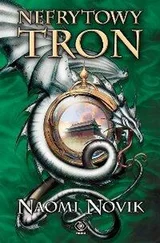“I do not care if anyone else minds,” Temeraire said, “or if it takes a long time; Laurence, I am so very happy, I only wish we were at home already.”
All that night and the next day they continued to labor over the harnesses; the cavalry-horses’ tack was soon seized upon and cannibalized, and the tanners’ shops raided. Dusk was falling and Fellowes was still frantically climbing with his men all over the dragons, sewing on more carrying-loops, of anything which was left—leather, rope, braided silk—until they seemed to be festooned with ribbons and bows and flounces. “It is as good as Court dress,” Ferris said, to much muffled hilarity, as a ration of spirits was passed around, “we ought to fly straight to London and present them to the Queen.”
The Fleur-de-Nuit took up his appointed position at the usual hour, settling back on his haunches for the night’s duty; as the night deepened, the edges of his midnight blue hide slowly faded into the general darkness, until all that could be seen of him were his enormous dinner-plate eyes, milky white and illuminated by the reflections of the campfires. Occasionally he stirred, or turned round to have a look towards the ocean, and the eyes would vanish for a moment; but they always came back again.
Tharkay had slipped out a few hours before. They watched, anxiously; for an eternity counting by the heartbeat, for two turns counting by the glass. The dragons were all ranged in lines, the first men aboard and ready to go at once. “If nothing comes of it,” Laurence said softly, but then the palely gleaming eyes blinked once, twice; then for a little longer; then again; and then with the lids drooping gradually to cover them, they drifted slowly and languorously to the ground, and the last narrow slits winked out of sight.
“Mark time,” Laurence called down to the aides-decamp standing anxiously below, holding their hourglasses ready; then Temeraire leapt away, straining a little under the weight. Laurence found it queer to be conscious of so many men aboard, so many strangers crowding near him: the communal nervous quickening of their breath like a rasp, the muffled curses and low cries silenced at once by their neighbors, their bodies and their warmth muting the biting force of the wind.
Temeraire followed the river out through the city walls: staying over the water so that the living sound of the current running down to the sea should mask the sound of his wings. Boats drawn up along the sides of the river creaked their ropes, murmuring, and the great brooding bulk of the harbor crane protruded vulturelike over the water. The river was smooth and black beneath them, spangled a little with reflections, the fires of the French camp throwing small yellow flickers onto the low swells.
To their either side, the French encampment lay sprawling over the banks of the river, lantern glims showing here and there the slope of a dragon’s body, the fold of a wing, the pitted blue iron of a cannon-barrel. Lumps that were soldiers lay sleeping in their rough bivouacs, huddled near one another under blankets of coarse wool, overcoats, or only mats of straw, with their feet poking out towards the fires. If there were any sounds to be heard from the camp, however, Laurence did not know it; his heart was beating too loudly in his ears as they went gliding by, Temeraire’s wingbeats almost languidly slow.
And then they were breathing again as the fires and lights fell behind them; they had come safely past the edges of the encampment with one mile of soft marshy ground to the sea, the sound of the surf rising ahead: Temeraire put on eager speed, and the wind began to whistle past the edges of his wings; somewhere hanging off the rigging below, Laurence heard a man vomiting. They were already over the ocean; the ship-lanterns beckoned them on, almost glaring bright with no moon for competition. As they drew near Laurence could see a candelabrum standing in the stern-windows of one of the ships, a seventy-four, illuminating the golden letters upon her stern: she was the Vanguard, and Laurence leaned forward and pointed Temeraire towards her.
Young Turner crept out onto Temeraire’s shoulder and held up the night-signal lantern where it could be seen, showing the friendly signal out its front, one long blue light, two short red, with thin squares of cloth laid over the lantern-hole to make the colors, and then the three short white lights to request a silent response; and again, as they drew nearer and nearer. There was a delay; had the lookout not seen? was the signal too old? Laurence had not seen a new signal-book in almost a year.
But then the quick blue–red–blue–red of the answer shone back at them, and there were more lights coming out on deck as they descended. “Ahoy the ship,” Laurence called, cupping his hands around his mouth.
“Ahoy the wing,” came the baffled reply, from the officer of the watch, faint and hard to hear, “and who the devil are you?”
Temeraire hovered carefully overhead; they flung down long knotted ropes, the ends thumping hollowly upon the deck of the ship, and the men began to struggle loose from the harness with excessive haste to be off. “Temeraire, tell them to go carefully, there,” Laurence said sharply. “The harness won’t stand hard use, and their fellows will be next aboard.”
Temeraire rumbled at them low, in German, and the descent calmed a little; still further when one man, missing his grasp, slipped and went tumbling down with a too-loud cry that broke only with the wet melon-thump sound of his head striking against the deck. Afterwards the others went more warily, and below, their officers began to force them back against the ship’s rails and out of the way, using hands and sticks to push them into place instead of shouted orders.
“Is everyone down?” Temeraire asked Laurence; only a handful of the crew were left, up on his back, and at Laurence’s nod, Temeraire carefully let himself down and slipped into the water beside the ship, scarcely throwing up a splash. There was a great deal of noise beginning to rise from the deck, the sailors and soldiers talking at one another urgently and uselessly in their different tongues, and the officers having difficulty reaching one another through the crowd of men; the crew were showing lanterns wildly in every direction.
“Hush!” Temeraire said to them all sharply, putting his head over the side, “and put away those lights; can you not see we are trying to keep quiet? And if any of you do not listen to me or begin to scream, like great children, just because I am a dragon, I will pick you up and throw you overboard, see if I do not,” he added.
“Where is the captain?” Laurence called up, into a perfect silence, Temeraire’s threat having been taken most seriously.
“Will? Is that Will Laurence?” A man in a nightshirt and cap leaned over the side, staring. “The devil, man, did you miss the sea so much you had to turn your dragon into a ship? What is his rating?”
“Gerry,” Laurence said, grinning, “you will do me the kindness to send out every last boat you have to carry the message to the other ships; we are bringing out the garrison, and we must get them embarked by morning, or the French will make the country too hot to hold us.”
“What, the whole garrison?” Captain Stuart said. “How many of them are there?”
“Fifteen thousand, more or less,” Laurence said. “Never mind,” he added, as Stuart began to splutter, “you must pack them in somehow, and at least get them over to Sweden; they are damned brave fellows, and we aren’t leaving them behind. I must get back to ferrying; God only knows how long we have until they notice us.”
Going back to the city they passed over Arkady coming with his own load; the feral leader was nipping at the tails of a couple of the younger members of his flock, keeping them from meandering off the course; he waved his tail-tip at Temeraire as they shot by, Temeraire stretched out full-length and going as fast as he might, as quiet as he might. The courtyard was in controlled havoc, the battalions marching out one after another in parade-ground order to their assigned dragons, boarding them with as little noise as could be managed.
Читать дальше












